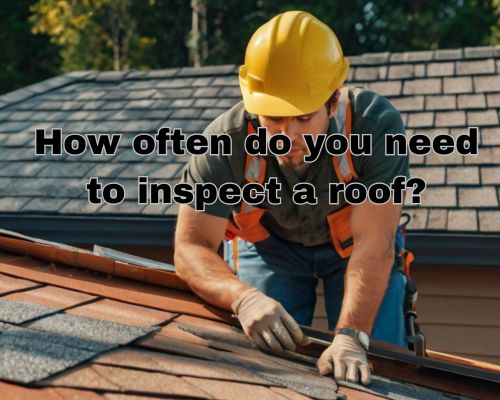How Often Do You Need to Inspect a Roof in New Jersey?
How Often Do You Need to Inspect a Roof in New Jersey?
Roof inspection is a vital component of home maintenance, ensuring that your property remains structurally sound, energy-efficient, and safe. If you’re a homeowner in New Jersey, understanding how often you need to inspect your roof is crucial, especially with the state’s unique climate and environmental conditions. With CJ Commercial Roofing NJ, let’s dive into the essential details to help you stay proactive and protect your investment.

Why Regular Roof Inspections Are Important
New Jersey experiences diverse weather patterns, from snowy winters to humid summers and everything in between. These fluctuations can take a toll on your roof. Regular inspections help:
- Identify Damage Early: Whether it’s loose shingles, leaks, or cracks, early detection can save you thousands in repair costs.
- Extend Roof Lifespan: Regular maintenance prevents minor issues from escalating into major problems, ensuring your roof lasts its full expected life.
- Preserve Home Value: A well-maintained roof boosts curb appeal and maintains property value, especially important if you plan to sell.
How Often Should You Inspect Your Roof in New Jersey?
The general recommendation is to inspect your roof twice a year, ideally in the spring and fall. However, certain factors specific to New Jersey might influence this schedule:
- Post-Storm Inspections: New Jersey’s weather can be unpredictable, with nor’easters, thunderstorms, and occasional hurricanes. After severe weather events, it’s critical to inspect your roof for damage.
- Age of the Roof: Older roofs (10+ years) require more frequent inspections, as wear and tear can accelerate with time.
- Type of Roofing Material: Asphalt shingles, common in New Jersey, are durable but may need closer monitoring compared to materials like metal or tile.
- Proximity to Trees: Homes surrounded by trees face additional risks from falling branches and debris accumulation.
Key Areas to Inspect on Your Roof
When inspecting your roof, pay close attention to these areas:
- Shingles: Look for curling, cracking, or missing shingles, which are signs of aging or storm damage.
- Flashing: Inspect flashing around chimneys, vents, and skylights to ensure it’s secure and watertight.
- Gutters: Clear gutters of debris and check for signs of sagging or improper drainage.
- Attic: Don’t forget to examine the attic for signs of leaks, moisture, or mold, which could indicate roof damage.
- Soffits and Fascia: These often-overlooked areas can show signs of water damage or pest infestations.
DIY vs. Professional Roof Inspections
While DIY inspections can help you spot obvious issues, professional roof inspections in New Jersey provide a more thorough evaluation. Certified roofers like in CJ Commercial Roofing NJ, have the expertise to:
- Use advanced tools like thermal imaging to detect hidden leaks.
- Identify issues that aren’t visible from the ground.
- Provide documentation for insurance claims or home sales.
Local New Jersey roofing companies are familiar with the state’s weather patterns and common roofing problems, making them an invaluable resource for homeowners.
Seasonal Considerations in New Jersey
New Jersey’s distinct seasons influence how often and when you should inspect your roof:
- Spring: After the harsh winter months, check for damage caused by snow, ice, and freezing temperatures.
- Summer: High humidity can lead to moisture buildup and algae growth, particularly on shaded roofs.
- Fall: Clear away leaves and debris to prepare your roof for winter storms.
- Winter: Heavy snowfall can strain your roof. Monitor for ice dams and consider scheduling a mid-winter inspection during mild weather.
Local Regulations and Insurance Requirements
In New Jersey, many insurance providers require proof of regular roof inspections to process claims for damage. Be sure to:
- Keep detailed records of inspections and maintenance.
- Hire licensed and insured roofing contractors to ensure compliance with local building codes.
For example, towns like Jersey City, Hoboken, and Princeton may have unique ordinances regarding roof maintenance. Always check with your local municipality for specific guidelines.
Signs It’s Time for an Inspection
Even if you adhere to a regular inspection schedule, certain signs may require immediate attention:
- Water Stains on Ceilings or Walls: A clear indicator of a roof leak.
- Increased Energy Bills: Poor insulation due to roof damage can drive up heating and cooling costs.
- Sagging Roofline: A structural issue that needs urgent professional evaluation.
- Moss or Algae Growth: Particularly common in humid areas of New Jersey, this can degrade roofing materials over time.
Choosing a Roofing Contractor in New Jersey
When hiring a professional roofer, look for:
- Local Experience: Contractors familiar with New Jersey’s climate will be better equipped to handle regional challenges.
- Certifications and Reviews: Choose a company with good reviews and certifications from reputable organizations like the National Roofing Contractors Association (NRCA).
- Warranty Offerings: Ensure they provide warranties for both labor and materials.
Some well-known roofing companies in New Jersey specialize in residential services, including inspections, repairs, and replacements.
Cost of Roof Inspections in New Jersey
The average cost for a professional roof inspection in New Jersey ranges from $150 to $350, depending on factors such as:
- Size of your roof.
- Roofing material.
- Additional services, like gutter cleaning or thermal imaging.
This small investment can save you significant costs in the long run by preventing major repairs.
Conclusion: Proactive Roof Care Pays Off
In New Jersey, where weather conditions can be unpredictable, staying on top of your roof maintenance is essential. By scheduling regular inspections, addressing issues promptly, and working with experienced local contractors, you can protect your home, extend the life of your roof, and maintain its value.
So, how often do you need to inspect your roof? For New Jersey homeowners, the answer lies in regular, seasonal, and post-storm evaluations. Whether it’s a quaint home in Cape May or a modern house in Morristown, proactive roof care ensures peace of mind and long-term savings.
